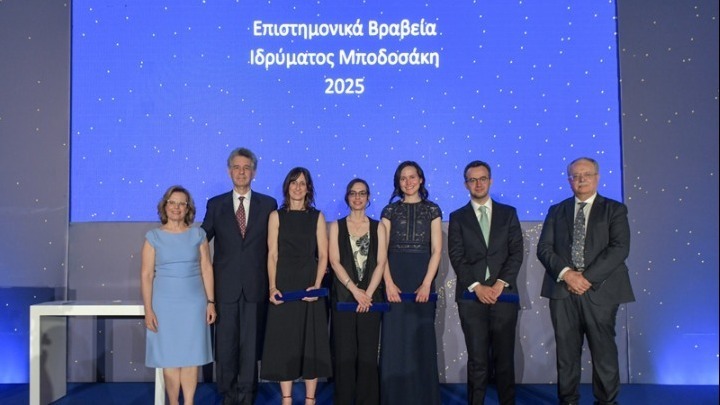Bodossakis Foundation 2025 Scientific Awards Ceremony: Highlighting the globally pioneering work of four young Greek scientists

Four pioneering researchers and innovative scientists, who have contributed to the advancement of knowledge and society, were honoured at the Bodossaki Foundation Scientific Awards ceremony for 2025, in the presence of representatives of the state and important personalities from the academic, scientific and business worlds, as well as from the fields of culture and civil society.
Maria Petropoulou, Assistant Professor of Physics at the National and Kapodistrian University of Athens, was awarded the Scientific Prize for Basic Sciences in the field of Physics. During the ceremony, she attempted an exploration of the invisible universe, presenting how the combination of light, cosmic rays and neutrinos offers us a more complete picture of objects hundreds of millions of light years away from us. Her work bridges theory with astronomical observations and is part of the rapidly evolving field of High Energy and Multiple Messenger Astrophysics, seeking solutions to fundamental problems in astrophysics.
Vicky Fouka, Associate Professor of Political Science at Stanford University, was awarded the Scientific Prize for Social Sciences in the field of Political Science. She presented how, by combining historical and statistical analysis, she examines societies that have experienced significant migration flows over time. Her research studies how various factors and different state policies have influenced the social integration and social identities of migrants.
By integrating models of human behavior from economics and social psychology, she approaches social science research through diverse theoretical and empirical methods.
Stavroula Hatzios, Associate Professor of Molecular, Cellular, and Developmental Biology and Chemistry at Yale University, was awarded the Scientific Prize for Biosciences in the field of Biomedical Sciences. She began her presentation with the question of how our body distinguishes between good and bad microbes, introducing us to the research conducted at her Yale laboratory. By combining chemistry and microbiology, her lab aims to understand complex interactions within the human body and the findings emerging from this interdisciplinary approach.
Through her work, she hopes to contribute to the development of new methods for diagnosing and treating gastrointestinal cancers and to uncover novel links between nutrition, bacteria, and diseases, while inspiring younger generations of scientists, particularly women.
Ioannis Gioulekas, an associate professor at the Robotics Institute at Carnegie Mellon University, was awarded the Science Award in Applied Science Technology in the field of Artificial Intelligence. His research work in computational imaging opens new horizons in many fields, including “ beyond-the-line imaging,” one of the great successes of computational imaging in the last decade. At the award ceremony, he explained how this technology allows, through appropriate computational algorithms, the creation of a three-dimensional image of “ hidden” objects, which are not directly visible to a camera, and is applied in a large number of fields, such as endoscopy for medicine and industry, tissue and brain imaging for medical applications, robot and autonomous car navigation, and rescue and similar military missions.

